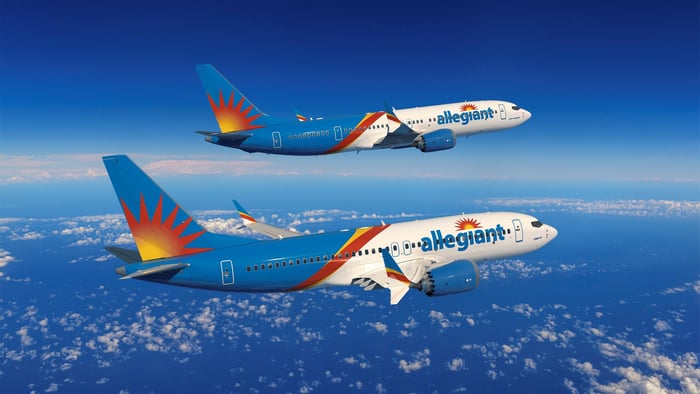In 2021, Boeing (BA 0.49%) continued to lose money and burn cash, weighing on the company's shares. That said, the aerospace giant's performance did improve in one respect last year, as order activity for its commercial jets rebounded.
Boeing has reported several additional order wins recently, which will bolster its full-year order total, set to be revealed this week. Nevertheless, the company's critical commercial airplanes business still seems unlikely to make a full recovery in the years ahead.
More orders come in
In the first 11 months of 2021, Boeing recorded 829 gross orders for commercial jets. Net of cancellations and accounting adjustments, it booked 457 orders. While these results would have been considered subpar a few years ago, they marked a welcome change from 2019 and 2020, when Boeing's order backlog shrank dramatically.
In late December, Boeing announced that UPS had ordered 19 767 freighters for delivery between 2023 and 2025. Just last week, it announced another freighter deal, as Atlas Air ordered four 777Fs at the end of December. Even before securing those deals, Boeing had sold a record number of freighters in 2021, tapping into surging demand for dedicated cargo aircraft.

Image source: Boeing.
Most notably, Allegiant Air ordered 50 Boeing 737 MAX jets, with options for another 50. The 50 firm orders are scheduled for delivery between 2023 and 2025.
On the other hand...
While getting some orders is better than none, Boeing's recent order activity doesn't bode particularly well for its future. First, the company's recent wave of freighter orders isn't sustainable, because of the impending arrival of the Airbus (EADSY 0.54%) A350 freighter in late 2025, new emissions regulations that will force Boeing to end production of its current freighter models by Jan. 1, 2028, and the normalization of the air cargo market.
As for the Allegiant deal, the budget airline has a reputation for penny-pinching. Management says the annual ownership costs for its new 737 MAX jets will be in line with its current Airbus fleet, most of which was acquired used at low prices. Even accounting for a longer useful life for new aircraft, this implies that Boeing sold these planes at extremely low prices.
Additionally, investors shouldn't overlook the deals that Boeing didn't win. On Dec. 16, Qantas announced that it plans to order 40 Airbus A220s and A321XLRs, with options for 94 more Airbus jets. The very same day, Air France-KLM said that it had ordered 100 Airbus A320neo-family jets for its KLM and Transavia subsidiaries, with purchase rights for 60 more.
Both of these orders represented conquests for Airbus, as Qantas, KLM, and Transavia have all-Boeing mainline narrow-body fleets today. Losing those deals to its European rival may explain why Boeing was willing to compromise on price to land the Allegiant order.

Image source: Boeing.
Buying time
While Boeing recorded a solid number of narrow-body orders last year, it leaned heavily on its biggest customers -- who typically negotiate the biggest discounts -- to pad its order total. It also sold dozens of "white-tail" jets in its inventory, which also tend to fetch low prices. Now, it appears to have signed another deeply discounted 737 MAX deal with Allegiant.
Indeed, Boeing seems to be compromising on near-term margins in order to get 737 MAX production back up to pre-pandemic levels as soon as possible. Meanwhile, it is holding the line on pricing for orders beyond 2025 to permit a margin recovery later in the decade.
Similarly, in the wide-body market, Boeing is leaning heavily on freighter orders that can be fulfilled over the next few years. While this source of orders is likely to taper off before long, it can partially offset weak near-term demand for Boeing's 787 and 777X passenger wide-bodies.
All in all, Boeing's strategy could best be described as buying time while waiting for a more robust demand recovery. However, with Airbus looking to ramp up production to expand its market share lead -- and most airlines apparently preferring Airbus' products today -- Boeing will continue to face tough trade-offs between volume and pricing over the next decade. That will keep cash flow grounded well below the lofty levels reached a few years ago.





